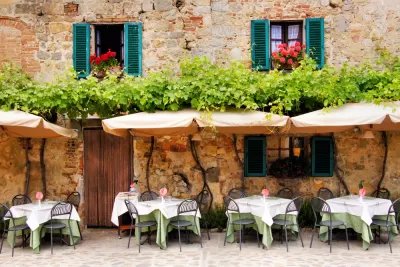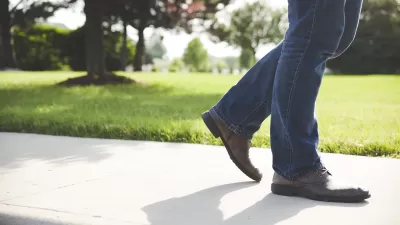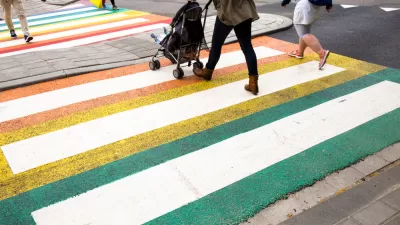Sidewalk-adjacent eating spaces generally separate diners from pedestrians. By using markers instead of fences, some Seattle eateries are opening their dining areas to the street.

To fence or not to fence? Stephen Fesler discusses a Seattle Department of Transportation initiative promoting fence-free cafes. "Sidewalk cafés are a traditional element of right-of-way use that goes back centuries. They provide for street activation and can be a reasonable use of excess space in the public realm."
In part, regulations around how establishments serve liquor determine whether they can go fence-free. "The fence-free sidewalk cafés came about as an option in response to changes by the Washington State Liquor and Cannabis Board that allows restaurants to serve alcohol on sidewalks as long as pavement makers clearly identify the bounds of the sidewalk café."
Of course, the prospect of an unfenced outdoor dining experience may not be to everyone's liking. Fesler writes, "Some sidewalk café patrons may not be terribly keen on passerby walking so closely by–but such is the life of a busy, dense urban environment."
FULL STORY: Seattle’s Sidewalk Café Are Going Fence-Free

Maui's Vacation Rental Debate Turns Ugly
Verbal attacks, misinformation campaigns and fistfights plague a high-stakes debate to convert thousands of vacation rentals into long-term housing.

Planetizen Federal Action Tracker
A weekly monitor of how Trump’s orders and actions are impacting planners and planning in America.

In Urban Planning, AI Prompting Could be the New Design Thinking
Creativity has long been key to great urban design. What if we see AI as our new creative partner?

King County Supportive Housing Program Offers Hope for Unhoused Residents
The county is taking a ‘Housing First’ approach that prioritizes getting people into housing, then offering wraparound supportive services.

Researchers Use AI to Get Clearer Picture of US Housing
Analysts are using artificial intelligence to supercharge their research by allowing them to comb through data faster. Though these AI tools can be error prone, they save time and housing researchers are optimistic about the future.

Making Shared Micromobility More Inclusive
Cities and shared mobility system operators can do more to include people with disabilities in planning and operations, per a new report.
Urban Design for Planners 1: Software Tools
This six-course series explores essential urban design concepts using open source software and equips planners with the tools they need to participate fully in the urban design process.
Planning for Universal Design
Learn the tools for implementing Universal Design in planning regulations.
planning NEXT
Appalachian Highlands Housing Partners
Gallatin County Department of Planning & Community Development
Mpact (founded as Rail~Volution)
City of Camden Redevelopment Agency
City of Astoria
City of Portland
City of Laramie





























